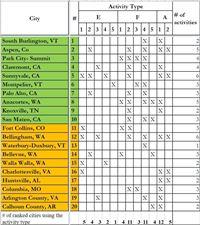The Energy Efficiency Prize: Simple Design to Overcome Complex Barriers

The Georgetown University Energy Prize (GUEP) was launched in 2014 and challenged cities and counties of populations ranging from 5,000 to 250,000 to reduce their energy use during a two-year competition period (2015-2016). The focus of the competition is on the reduction of municipal and residential building energy use by increasing energy efficiency. The design strength of the competition is that it allows communities to create the approaches that best fit their needs in order to address one or more of these barriers.
This paper surveys public sources of information to identify the efforts that have been undertaken by the 50 semi-finalist cities. It further categorizes these efforts into three major typologies and several sub-typologies of energy-efficiency efforts. These typologies are sorted according to the hierarchy of rankings based on the GUEP dashboard, providing a cluster visualization of impactful efforts.
The paper concludes with a discussion of typology combinations that appear to have the greatest utility in this preliminary study and outlines further research directions based on future data submitted by the actively participating cities.
keywords: Energy-efficiency, energy-efficiency gap, Energy Prize, GUEP


Add comment
Log in to post comments